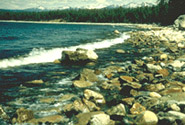Russian Federation

- © UNESCO
- Lake Baikal
The Russian Federation joined UNESCO on April 21, 1954.
In 2007, plans were launched for the creation of a “Sustainable Energy Development Centre” in Moscow, under the auspices of UNESCO.
UNESCO actively participated in the organization of the G8 Ministerial Meeting on Education held in Moscow in 2006. The meeting, prior to the G8 Summit in St Petersburg, adopted the Moscow Declaration focused on the role of education in shaping innovative societies.
The Russian Federation has 23 sites inscribed on the World Heritage List, 15 of them cultural and 8 natural. In 2006, Russia decided to re-route the planned
trans-Siberian oil pipeline to ensure the protection of Lake Baikal, the world’s oldest and deepest lake, inscribed on the List in 1996.
The lake’s ecological situation is monitored by the UNESCO Chair for Water Resources of the Irkutsk State University. A total of 45 UNESCO Chairs have been established in the Russian Federation, the second biggest national network of Chairs.
UNESCO’s Man And the Biosphere (MAB) programme counts 37 biosphere reserves in Russia.
Seven Russian collections are now inscribed on the “Memory of the World” Register.
Anna Politkovskaya, the late Russian journalist, was named the laureate of the 2007 UNESCO/Guillermo Cano World Press Freedom Prize.

